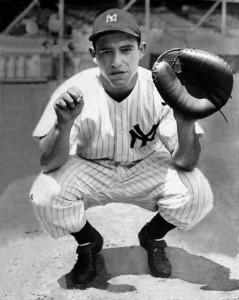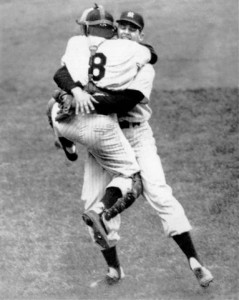Yogi Berra Transcended Baseball
Yogi Berra, who has passed away at the age of 90, wasn’t just a baseball legend, but also an American hero, cultural icon and national treasure. Not too bad for the son of an Italian immigrant who grew up in St. Louis.
Growing up across the street from another future baseball icon Joe Garagiola, Berra was an American Legion standout before signing with the New York Yankees in 1942.
Starting his career with the Norfolk Tides, who were a member of the Class B Piedmont League, Berra once drove in 23 runs in a doubleheader.
Like many other future baseball stars, Berra served in World War II. As a gunner’s mate, Berra served on the USS Bayfield during the D-Day invasion of France.
Following the war, Berra returned to baseball and despite not possessing great size or athleticism, soon began turning heads with his baseball abilities. He was tutored as a catcher by Hall of Famer Bill Dickey and eventually followed in Dickey’s footsteps wearing number 8 for the New York Yankees.
After appearing in seven games at the major league level in 1946, Berra appeared in 83 games in 1947 and was on his way to a long and illustrious major league career.
Berra made the first of his record 14 World Series appearances in 1947 and earned his first championship ring despite hitting only .158 with a home run and two RBI in six games against the Brooklyn Dodgers.
The following season Berra made the first of 15 straight All Star appearances while hitting .305 with 14 home runs and 98 RBI.
One of the elements that made Berra such an iconic baseball figure was that he served as a bridge between generations of Yankee greatness. He played five seasons with the legendary Joe DiMaggio and then spent more than a decade with the next iconic Yankee Mickey Mantle. While Berra didn’t necessarily have the physical talents of either of those stars, he ended up matching the Yankee legends as three-time winners of the American League MVP award.
Beginning in 1950, Berra embarked on a seven year stretch where he was the AL MVP three times, finished second twice, and was third and fourth in the other two seasons.
Interestingly enough, his best overall statistical season during the stretch occurred in 1950 when he finished third in the MVP voting while hitting .322 with 28 home runs and 124 RBI. He claimed his first MVP award the next season when he hit .294 with 27 home runs and 88 RBI.
After never hitting better than .261 during his first five World Series appearances, Berra broke out in 1953 as he batted .429 with a home run and four RBI to help the Yankees claim their fifth straight title.
The Yankees lost a World Series for the first time in Berra’s career in 1955, but Yogi batted .417 in the seven game series. The next season he not only hit .360 with a career-best 10 series RBI as the Yankees regained the title, he also was behind the plate for the only perfect game in World Series history when Don Larsen retired 27 straight Dodgers.
As the Yankees dominated baseball in the 1950s, the legend of Yogi (he received the nickname because of his perceived resemblance to a Hindu yogi) grew right along with that of the other stars of the team in pinstripes.
He became known for his “Yogiisms”, many of which have become part of common American language. Sayings like “It ain’t over till it’s over”, “when you come to a fork in the road, take it” and “it’s déjà vu all over again” are all attributed to a man who quit school after the eighth grade, but has made an impact far beyond just being another baseball player.
In fact, the popular cartoon character Yogi Bear first appeared in the late 1950s and was clearly patterned after the baseball icon.
Berra’s statistical numbers started to side slightly following his 1950-56 run, but he remained a key part of the Yankee dynasty through the 1963 season.
In 1964, Berra put up his glove and bat, but remained on the Yankee bench as the manager. He led the team to 99 victories and the AL Pennant, but was fired after losing the World Series to the St. Louis Cardinals in seven games.
It was truly the end of an era as the Yankees had appeared in 15 World Series since Berra’s first full season in 1947, but after his departure would not make another trip to the fall classic for 12 years, ironically – or not – after Berra returned to the team as a coach.
Berra briefly returned to the field in 1965 playing in four games for the New York Mets, but after that stint served eight years as a coach for the Mets. He was part of the 1969 “Miracle Mets” and following the death of manager Gil Hodges in 1972 became manager. In 1973 he led the Mets to the NL Pennant and a trip to the World Series where they lost in seven games to the Oakland A’s.
Berra was fired by the Mets during the 1075 season and soon found his way back to the Bronx as a coach for Yankees manager and former teammate Billy Martin.
Illustrating the same winning charm he had as a player, the Yankees reached the World Series in each of Yogi’s first three years as a coach. They lost to the Cincinnati Reds in 1976, but edged the Dodgers in each of the next two seasons to give Berra an amazing 13 World Series champion rings as a player or coach.
His former coach Casey Stengel once said of Berra “He’d fall in a sewer and come up with a gold watch.”
Two decades after having first managed the Yankees, Berra was named manager of the team in 1984 and led them to an 87-75 record and third place finish in their division. Despite being assured he would be the manager of the Yankees for the entire 1985 season, he was dismissed after a rough 6-10 start.
However, Yogi’s magic was not completely spent as he soon became a bench coach for the Houston Astros and in 1986 helped the Astros win the NL West and reach the NL Championship Series where they, ironically, lost a classic series to the New York Mets.
It would be more than a decade before Berra returned to Yankee Stadium. That happened in true Yogi fashion on July 18, 1999 when Yogi returned for Yogi Berra Day and caught a ceremonial first pitch from Don Larsen. The day didn’t just include a remembrance of the 1956 perfect game, it also included a new one as David Cone tossed a perfect game that afternoon against the Montreal Expos.
Over the remainder of his life, Berra was a regular part of ceremonies at the old and new Yankee Stadium and was introduced to new generations of fans through his appearance on Aflac commercials.
So in the end, the world has lost a great baseball and American legend, but Yogi Berra is a part of the American lexicon that will always be with us.






Baseball is my favorite game and its not much hard to play rather the availability of online schools will make you earn your degree with so much ease. Nevertheless you will still encounter the issues of homework and other types of assignments.
Your post is amazing. I want to more information about it.keep it up.
RBI Grade B